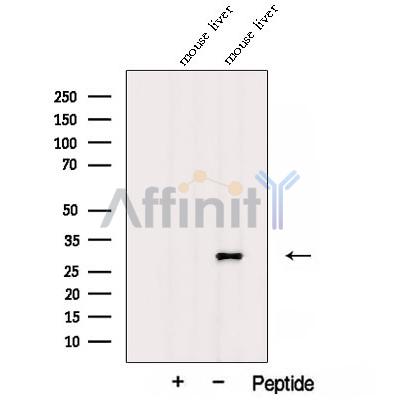AFMID Antibody - #DF12814
| Product: | AFMID Antibody |
| Catalog: | DF12814 |
| Description: | Rabbit polyclonal antibody to AFMID |
| Application: | WB IF/ICC |
| Reactivity: | Human, Mouse |
| Prediction: | Pig, Zebrafish, Bovine, Horse, Sheep, Rabbit, Chicken, Xenopus |
| Mol.Wt.: | 30 kDa; 34kD(Calculated). |
| Uniprot: | Q63HM1 |
| RRID: | AB_2845775 |
Related Downloads
Protocols
Product Info
*The optimal dilutions should be determined by the end user. For optimal experimental results, antibody reuse is not recommended.
*Tips:
WB: For western blot detection of denatured protein samples. IHC: For immunohistochemical detection of paraffin sections (IHC-p) or frozen sections (IHC-f) of tissue samples. IF/ICC: For immunofluorescence detection of cell samples. ELISA(peptide): For ELISA detection of antigenic peptide.
Cite Format: Affinity Biosciences Cat# DF12814, RRID:AB_2845775.
Fold/Unfold
afmid; AFMID_HUMAN; KF; Kynurenine formamidase; Probable arylformamidase;
Immunogens
A synthesized peptide derived from human AFMID, corresponding to a region within the internal amino acids.
- Q63HM1 KFA_HUMAN:
- Protein BLAST With
- NCBI/
- ExPASy/
- Uniprot
MMDVSGVGFPSKVPWKKMSAEELENQYCPSRWVVRLGAEEALRTYSQIGIEATTRARATRKSLLHVPYGDGEGEKVDIYFPDESSEALPFFLFFHGGYWQSGSKDESAFMVHPLTAQGVAVVIVAYGIAPKGTLDHMVDQVTRSVAFVQKRYPSNKGIYLCGHSAGAHLAAMMLLADWTKHGVTPNLRGFFLVSGVFDLEPIVYTSQNVALQLTLEDAQRNSPQLKVAQAQPVDPTCRVLVVVGQFDSPEFHRQSWEFYQTLCQGEWKASFEELHDVDHFEIVENLTQKDNVLTQIILKTIFQ
Predictions
Score>80(red) has high confidence and is suggested to be used for WB detection. *The prediction model is mainly based on the alignment of immunogen sequences, the results are for reference only, not as the basis of quality assurance.
High(score>80) Medium(80>score>50) Low(score<50) No confidence
Research Backgrounds
Catalyzes the hydrolysis of N-formyl-L-kynurenine to L-kynurenine, the second step in the kynurenine pathway of tryptophan degradation. Kynurenine may be further oxidized to nicotinic acid, NAD(H) and NADP(H). Required for elimination of toxic metabolites.
Cytoplasm>Cytosol. Nucleus.
Note: Predominantly cytosolic. Some fraction is nuclear.
The main chain amide nitrogen atoms of the second glycine and its adjacent residue in the HGGXW motif define the oxyanion hole, and stabilize the oxyanion that forms during the nucleophilic attack by the catalytic serine during substrate cleavage.
Belongs to the kynurenine formamidase family.
Research Fields
· Metabolism > Amino acid metabolism > Tryptophan metabolism.
· Metabolism > Carbohydrate metabolism > Glyoxylate and dicarboxylate metabolism.
· Metabolism > Global and overview maps > Metabolic pathways.
Restrictive clause
Affinity Biosciences tests all products strictly. Citations are provided as a resource for additional applications that have not been validated by Affinity Biosciences. Please choose the appropriate format for each application and consult Materials and Methods sections for additional details about the use of any product in these publications.
For Research Use Only.
Not for use in diagnostic or therapeutic procedures. Not for resale. Not for distribution without written consent. Affinity Biosciences will not be held responsible for patent infringement or other violations that may occur with the use of our products. Affinity Biosciences, Affinity Biosciences Logo and all other trademarks are the property of Affinity Biosciences LTD.

